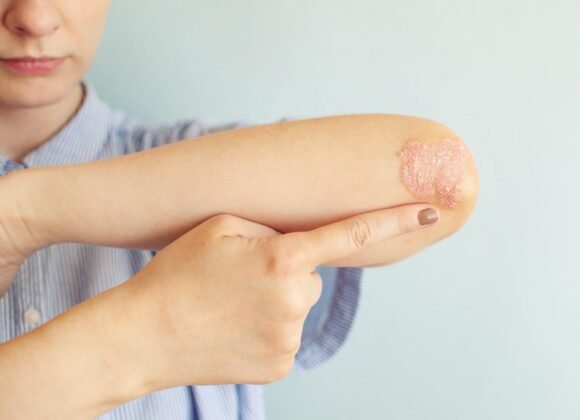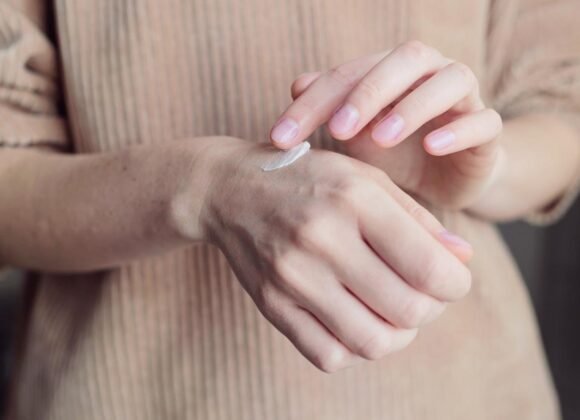Facial eczema, also known as atopic dermatitis, is a chronic skin condition characterized by inflammation, itching, and redness on the face. It affects people of all ages but is particularly common in children. Symptoms can vary among individuals but typically include dry, scaly skin, red or inflamed patches, and intense itching.
These symptoms can cause discomfort and pain, potentially reducing the quality of life for those affected. Various factors can trigger facial eczema, including environmental irritants like harsh soaps or detergents, allergens such as pet dander or pollen, and stress. Weather changes, especially dry or cold conditions, can also worsen symptoms.
Identifying and avoiding these triggers is crucial for managing the condition and preventing flare-ups. The visible nature of facial eczema can significantly impact a person’s emotional well-being, often leading to self-consciousness and embarrassment. It is essential for individuals with facial eczema to seek support and treatment for effective management of their condition.
Understanding the symptoms and triggers of facial eczema enables individuals to take proactive measures to minimize its impact on their daily lives.
Key Takeaways
- Facial eczema symptoms include redness, itching, dryness, and flaking
- Triggers for facial eczema can include stress, allergens, and harsh skincare products
- Use gentle, fragrance-free skincare products to manage facial eczema
- Common causes of facial eczema can include genetics, environmental factors, and immune system issues
- Soothe eczema symptoms with cool compresses, moisturizing creams, and avoiding triggers
- Lifestyle changes such as stress management and a healthy diet can help manage facial eczema
- Seek professional help for severe cases of facial eczema, including dermatologists and allergists
Skin Care Tips for Managing Facial Eczema
Cleansing the Face
When it comes to cleansing the face, it is important to use mild, fragrance-free cleansers that are specifically formulated for sensitive skin. Harsh soaps and cleansers can further irritate the skin and exacerbate eczema symptoms.
Moisturizing and Protecting the Skin
After cleansing, it is essential to moisturize the skin regularly with a thick, emollient cream or ointment to help lock in moisture and prevent dryness. In addition to a gentle cleansing and moisturizing routine, individuals with facial eczema should be mindful of the products they use on their skin. Avoiding products with harsh chemicals, fragrances, and dyes can help minimize irritation and reduce the risk of flare-ups.
Additional Tips for Managing Facial Eczema
It is also important to protect the skin from sun exposure by using a broad-spectrum sunscreen with a high SPF. Furthermore, individuals with facial eczema should be cautious when applying makeup or skincare products, as certain ingredients can trigger inflammation and worsen symptoms. Opting for hypoallergenic and non-comedogenic products can help minimize the risk of irritation. By following these skincare tips, individuals can help manage their facial eczema and reduce the frequency and severity of flare-ups.
Identifying Common Causes of Facial Eczema
There are several common causes of facial eczema that individuals should be aware of in order to effectively manage their condition. One common cause is exposure to environmental irritants, such as harsh soaps, detergents, and cleaning products. These substances can strip the skin of its natural oils and disrupt its barrier function, leading to dryness and inflammation.
Additionally, allergens like pet dander, pollen, and dust mites can trigger eczema flare-ups in sensitive individuals. Changes in weather can also play a role in exacerbating facial eczema symptoms. Dry or cold conditions can lead to increased skin dryness and irritation, while hot and humid weather can cause sweating and discomfort for those with eczema.
Stress is another common trigger for facial eczema, as it can weaken the immune system and lead to heightened inflammation in the skin. Furthermore, genetics can also play a role in the development of facial eczema. Individuals with a family history of eczema or other allergic conditions are more likely to develop the condition themselves.
By identifying these common causes of facial eczema, individuals can take proactive steps to minimize their exposure to triggers and reduce the frequency of flare-ups.
The Importance of Gentle Skin Care for Eczema-Prone Skin
Gentle skin care is crucial for individuals with eczema-prone skin, as harsh products and aggressive cleansing routines can exacerbate symptoms and lead to increased inflammation. When it comes to cleansing the skin, it is important to use mild, fragrance-free cleansers that are specifically formulated for sensitive skin. Harsh soaps and cleansers can strip the skin of its natural oils and disrupt its barrier function, leading to dryness and irritation.
After cleansing, it is essential to moisturize the skin regularly with a thick, emollient cream or ointment to help lock in moisture and prevent dryness. Moisturizing the skin helps restore its natural barrier function and reduces the risk of flare-ups. Additionally, individuals with eczema-prone skin should be mindful of the fabrics they come into contact with, as rough or scratchy materials can further irritate the skin.
It is also important for individuals with eczema-prone skin to avoid scratching or rubbing the affected areas, as this can lead to further inflammation and potential infection. Keeping the nails short and wearing cotton gloves at night can help prevent unintentional scratching during sleep. By prioritizing gentle skin care practices, individuals with eczema-prone skin can help manage their condition effectively and reduce the frequency of flare-ups.
Tips for Soothing and Calming Eczema Symptoms
Soothing and calming eczema symptoms is essential for individuals looking to manage their condition effectively. One effective way to soothe eczema symptoms is by taking short, lukewarm baths or showers with mild, fragrance-free cleansers. This can help hydrate the skin and alleviate itching without further irritating it.
After bathing, gently patting the skin dry with a soft towel and immediately applying a thick moisturizer can help lock in moisture and prevent dryness. In addition to moisturizing regularly, using cold compresses or wet wraps on inflamed areas can help reduce itching and inflammation. Cold compresses can provide immediate relief from itching, while wet wraps can help hydrate the skin and reduce redness.
It is important to consult with a healthcare professional before using wet wraps to ensure they are used safely and effectively. Furthermore, individuals with eczema can benefit from using over-the-counter or prescription topical treatments to help manage their symptoms. These treatments may include corticosteroid creams or ointments to reduce inflammation, as well as calcineurin inhibitors to help control itching and redness.
By incorporating these soothing and calming techniques into their skincare routine, individuals with eczema can help alleviate their symptoms and improve their overall quality of life.
Lifestyle Changes to Help Manage Facial Eczema
Dietary Changes for Eczema Management
One important lifestyle change is maintaining a healthy diet rich in fruits, vegetables, lean proteins, and healthy fats. Certain foods may trigger inflammation in some individuals with eczema, so it is important to identify potential food triggers and make dietary adjustments accordingly.
Managing Stress for Eczema Relief
In addition to diet, managing stress levels through relaxation techniques such as yoga, meditation, or deep breathing exercises can help reduce the frequency and severity of eczema flare-ups. Stress has been shown to exacerbate eczema symptoms in some individuals, so finding healthy ways to cope with stress is crucial for managing the condition.
Skincare and Clothing Choices for Eczema Management
Furthermore, individuals with facial eczema should be mindful of their clothing choices, opting for soft, breathable fabrics like cotton or silk that are less likely to irritate the skin. Avoiding tight-fitting clothing that can rub against the skin and cause friction is also important for managing facial eczema. Finally, maintaining a consistent skincare routine that includes gentle cleansing and regular moisturizing is essential for managing facial eczema. By making these lifestyle changes, individuals can help reduce their risk of flare-ups and improve their overall skin health.
Seeking Professional Help for Severe Eczema Cases
For individuals with severe or persistent facial eczema, seeking professional help from a dermatologist or allergist is crucial for effective management of the condition. These healthcare professionals can provide personalized treatment plans tailored to each individual’s specific needs. One common treatment option for severe facial eczema is prescription-strength topical corticosteroids or immunomodulators that can help reduce inflammation and control symptoms.
In some cases, oral medications may be prescribed to manage severe symptoms that do not respond well to topical treatments. Additionally, phototherapy or light therapy may be recommended for individuals with severe facial eczema. This treatment involves exposing the affected skin to controlled amounts of natural or artificial ultraviolet light under medical supervision.
In some cases, allergen testing may be recommended to identify specific triggers for facial eczema. Once triggers are identified, individuals can take proactive steps to avoid these triggers and reduce their risk of flare-ups. Overall, seeking professional help for severe cases of facial eczema is essential for effectively managing the condition and improving quality of life.
By working closely with healthcare professionals, individuals with severe facial eczema can develop personalized treatment plans that address their specific needs and promote healthier skin.
FAQs
What is facial eczema?
Facial eczema is a skin condition characterized by red, inflamed, and itchy patches on the face. It is a form of eczema that specifically affects the facial area.
What are the symptoms of facial eczema?
Symptoms of facial eczema may include red or inflamed skin, dry or scaly patches, itching, burning, and in severe cases, oozing or crusting.
What triggers facial eczema?
Facial eczema can be triggered by a variety of factors including stress, allergens, irritants, weather changes, and certain skincare products.
How can facial eczema be managed?
Managing facial eczema involves using gentle skincare products, avoiding triggers, keeping the skin moisturized, and seeking medical treatment if necessary.
What are some skin care tips for sensitive skin affected by facial eczema?
Some skin care tips for sensitive skin affected by facial eczema include using gentle, fragrance-free products, avoiding harsh exfoliants, keeping the skin moisturized, and protecting the skin from sun exposure.




